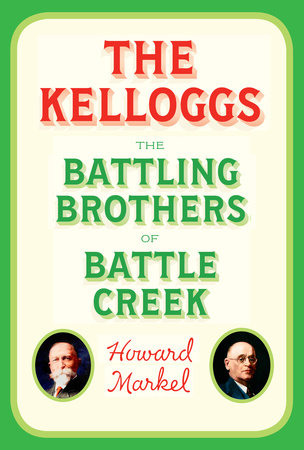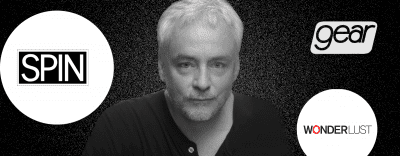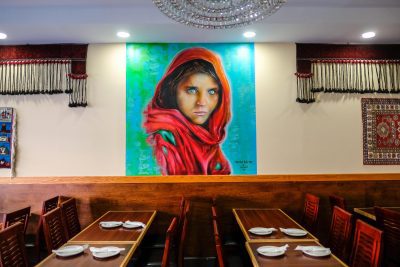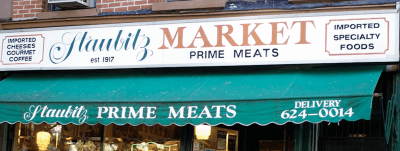Interview with 2018 NBCC Biography Award Finalist Howard Markel
For the past four years, the National Book Critics Circle has partnered with The New School’s MFA Creative Writing program, allowing the students to interview each of the NBCC Awards Finalists. In addition to building excitement for the Awards Finalist Reading and Ceremony held at the New School March 14th-15th, these interviews have built an intergenerational bridge between the writers of today and tomorrow.
This year, as part of the ongoing collaboration, and in support of the NBCC’s conversation about reading, criticism, and literature that extends from the local to the national, Brooklyn Magazine will publish and promote the interviews between NBCC Finalists and the current students of The New School.

The Kelloggs: The Battling Brothers of Battle Creek (Pantheon) is a biography of the Cain and Abel of America’s heartland. Written by Howard Markel, a physician, professor and medical historian from Michigan, the book covers one hundred years of history, from the brothers’ rise to fame and fortune, to their personal feud, early history of the medical profession, invention of the ready-to-eat breakfast and the creation of a new industry. It all began in the name of wellness and convenience.
Congratulations on your nomination for the National Book Critics Circle Award.
I’m thrilled by it.
How did you become interested in writing this book?
I’m a professor at the University of Michigan and part of my scholarship is to write books. Having grown up in Michigan, I had long known about the Kellogg family. One of the great field trips in the area around Detroit was to the Kellogg’s factory to watch them make cereal. You got a box of Frosted Flakes, which were and are great, and you got a Tony the Tiger bowl. I still have the bowl.
When I was in medical school at the University of Michigan, there were many buildings named after W.K. Kellogg, the little brother Will, who owned the cereal company and had this giant foundation that did a lot of good, particularly on issues of health, children and families. I also knew a little bit about John Harvey Kellogg so I thought even then, 30 years ago, somebody ought to write a book about these two fellows.
You had access to a huge amount of materials about Dr. Kellogg, the founder of one of the most famous health spas for the rich and famous in the late 1800s. He called his methods biologic living. But it was just the opposite for the more successful of the two brothers, Will, the man behind the Kellogg’s brand. As a writer, talk about the obstacles you faced in writing about Will and how you tackled this challenge.
The W.K. Kellogg Foundation owns the Will Kellogg papers. They will not allow anyone to look at them unless they sign a release that allows the communications officer to go through your manuscript before publication and they can then delete anything they find offensive to the memory of their founder. They’d take away my historian’s union card if I signed such a document and my publishers weren’t excited about it either.
One of the great things about being an older historian: as you get older and you’ve read more, you’ve made more connections. There’s only so many [historians] and they all interact. I did what is called a reach around that led to other archives with W.K. Kellogg’s letters to other people. He also was involved in one of the longest running lawsuits in Michigan history. He and his brother sued each other over who had the right to use the name Kellogg on their products. There are hundreds of depositions and legal papers that are all part of the public record where I could get a great sense of how Will spoke, thought, and I could get a lot about his story because many of these depositions were about how corn flakes were invented, his relationship with his father, his brother and family. So I was very fortunate to be able to take a detour and come in through the back door to document the Kellogg’s lives.
As combative as the Kellogg brothers were, you credit both of them with inventing corn flakes and dreaming up “the American pursuit of wellness.” Yet, neither corn flakes nor the Kellogg’s name is synonymous with wellness, is it?
Corn flakes were originally a health food. It was originally wheat flakes but corn was cheaper and also tasted better. The two of them worked in an experimental kitchen. The doctor invented dozens of new foods, including peanut butter. He also invented a lot of meat substitutes and grain dishes and corn flakes. Will was instrumental in that. Will figured there were a lot more healthy people who needed a quick, nutritious breakfast than there were sick people who needed it for their digestion. That was one of the doctor’s great concerns: digestion—normal bowel movements and not being constipated.
Seemed like half the people in America had a belly ache or were constipated in the late 1800s. These were the foods they created for that. A lot of biologic living, which the doctor prescribed at the sanitarium, were things that we recognize today—exercise, spirituality, freeing yourself from worry, not eating a ton of sugar, a vegetarian and grain based-diet, avoiding meats, alcohol or caffeine—these are all things associated with wellness but we don’t credit Dr. John Harvey Kellogg.
Both brothers were Seventh-Day Adventists, “a denomination predicting the imminent end of the world and the Second Coming of Jesus Christ,” but also visionaries and risk takers weren’t they?
The doctor was handpicked by the founders of the denomination to carry out the health aspect of the Seventh-Day Adventist. A big part of the faith is not just the end of the world but also that the body is a temple, to keep your body as healthy as possible for that advent and that included a lot of the things I just mentioned. John ran what became the Battle Creek Sanitarium. Will was not as deeply connected to the faith. Despite that, they were both remarkable men who each had their own version of brilliance and genius and insight.
The problem was they competed against one another as brothers often do. Because John Harvey was eight years older than Will, John often treated Will like the little brother. Even when Will worked for John at the sanitarium, for almost 25 years, John treated him very badly, didn’t pay him very well. He constantly disrespected or berated Will in front of others. The sanatorium would not have run as well as it did nor any of the doctor’s side businesses or as profitably as they did without Will’s business genius. They fought a lot and competed a lot and I don’t think either one could see or appreciate not only how brilliant the other brother was but how symbiotic their relationship and success was.
Now that your book has been out for some time and it’s been reviewed, would you do anything differently in writing The Kelloggs?
I rarely look at a book once it’s finished because there’s a million things I would find that I’d do differently. If you really practice the craft of good writing and I hope I do, you’re always trying to find a way to make a sentence more elegant, more persuasive, clearer to your reader. So there’s always things that you would change.
This was a tough book to write because the span is one hundred years, two brothers, and a million and one things that happened during their lives and careers. You have to make decisions about what to include, what not to include, how you develop a narrative arc and also how you sometimes have to separate things. There’s a chapter on eugenics, for example, as opposed to being part of the narrative because I thought [the book] really needed that to be as clear as possible.
You’ve written nearly a dozen books and this one is somewhat of a departure for you. Did this book change your writing? If so, how?
Every book, I think, helps make me a better writer. I love writing. I love reading. I love thinking about how to tell stories. I do it whether I’m lecturing or teaching, or with a patient. I’m taking their stories down, figuring things out, and writing a book. So I hope I get better with each book and I think I have.
This book stretched me quite a bit because it was on such a long period of time. One of the first books I wrote, Quarantine! about two epidemics in New York City in 1892 that were blamed on Russian-Jewish immigrants happened in about a nine-month period and it took me seven years to write. I really enjoy writing about epidemics because epidemics have beginnings, middles, and ends. Unlike many other medical phenomenon, you know when an epidemic strikes. Those earlier books got me thinking a great deal about narratives and I’m a narrative historian. As my best teacher used to say, “Don’t tell them so much as to show them.”
When you start a big book, it’s like being thrown in a deep lake and you have all this paper and all these files and you’re looking at them and trying to swim and make your way and you don’t really know where you’re going until you know where you’re going. When I started writing about the Kelloggs, it was going to be just about John Harvey Kellogg—that’s the book I pitched to my editor. But it became very clear that I couldn’t just write about John Harvey; that Will played an integral role in his life and vice versa. I love writing about conflict. There’s conflict in every one of my books. People love reading about other people’s conflicts.
Have you started your next book?
Yes, it’s going to be about the chase to discover DNA.
You might also like 


























